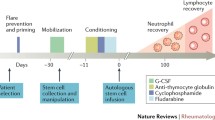Abstract
Autologous hematopoietic stem cell transplantation (HSCT) has been used for the treatment of both adult and pediatric autoimmune diseases. However, HSCT has significant side effects (neutropenia, thrombocytopenia, infertility, cardiotoxicity) and costs (HSC collection/harvesting, blood product support). In an attempt to avoid the toxicities and costs associated with HSCT, we investigated whether immune ablation similar to that achieved following myeloablative HSCT could be achieved by the intensive administration of an anti-CD52 antibody (Campath-1H antibody). The first patient treated with the treatment regime, who had refractory juvenile polymyositis, achieved immune ablation (the elimination of pre-therapy antigen-specific T lymphocyte immunity) and has had stable clinical improvement for more than 6 years.




Similar content being viewed by others
References
Fassas A, Anagnostopoulos A, Kazis A, Kapinas K, Sakellari I, Kimiskidis V, et al. Peripheral blood stem cell transplantation in the treatment of progressive multiple sclerosis: first results of a pilot study. Bone Marrow Transplant. 1997;20:631–8.
Nash RA, McSweeney PA, Crofford LJ, Abidi M, Chen CS, Godwin JD, et al. High-dose immunosuppressive therapy and autologous hematopoietic cell transplantation for severe systemic sclerosis: long-term follow-up of the US multicenter pilot study. Blood. 2007;110:1388–96.
Sullivan KM, Muraro P, Tyndall A. Hematopoietic cell transplantation for autoimmune disease: updates from Europe and the United States. Biol Blood Marrow Transplant. 2010;16:S48–56.
Farge D, Labopin M, Tyndall A, Fassas A, Mancardi L, Van Laar J, et al. Autologous hematopoietic stem cell transplantation for autoimmune diseases: an observational study on 12 years' experience from the European Group for Blood and Marrow Transplantation Working Party on Autoimmune Diseases. Haematologica. 2010;95:284–92.
Alexander T, Thiel A, Rosen O, et al. Depletion of autoreactive immunologic memory followed autologous hematopoietic stem cell transplantation in patients with refractory SLE induces long-term remission through de novo generation of a juvenile and tolerant immune system. Blood. 2009;113:214–23.
Muraro PA, Douek DC, Packer A, et al. Thymic output generates a new and diverse TCR repertoire after autologous stem cell transplantation in multiple sclerosis patients. J Exp Med. 2005;201:805–16.
Hale G, Zhang MJ, Bunjes D, Prentice HG, Spence D, Horowitz MM, et al. Improving the outcome of bone marrow transplantation by using CD52 monoclonal antibodies to prevent graft-versus-host disease and graft rejection. Blood. 1998;92:4581–90.
Hirst CL, Pace A, Pickersgille TP, Jones R, McLean BN, Zajicek JP, et al. Campath 1-H treatment in patients with aggressive relapsing remitting multiple sclerosis. J Neurol. 2008;255:231–8.
Keating MJ, Flinn I, Jain V, Binet J-L, Hillmen P, Byrd J, et al. Therapeutic role of alemtuzumab (Campath-1 H) in patients who have failed fludarabine: results of a large international study. Blood. 2002;99:3554–61.
Cohen G, Carter SL, Weinberg KI, Masinsin B, Guinan E, Kurtzberg J, et al. Antigen-specific T-lymphocyte function after cord blood transplantation. Biol Blood Marrow Transplant. 2006;12:1335–42.
Lam C, Young N, Marwaha J, McLimont M, Feldman BM. Revised versions of the Childhood Health Assessment Questionnaire (CHAQ) are more sensitive and suffer less from a ceiling effect. Arthritis Rheum. 2004;51:881–9.
Huber AM, Feldman BM, Rennebohm RM, Hicks JE, Lindsley CB, Perez MD, et al. Validation and clinical significance of the childhood myositis assessment scale for assessment of muscle function in the juvenile idiopathic inflammatory myopathies. Arthritis Rheum. 2004;50:1595–603.
Wimperis JZ, Brenner MK, Prentice HG, Thompson EJ, Hoffbrand AV. B cell development and regulation after T cell-depleted marrow transplantation. J Immunol. 1987;138:2445–50.
Lum LG. The kinetics of immune reconstitution after human marrow transplantation. Blood. 1987;69:369–80.
Ottinger HD, Beelen DW, Scheulen B, Schaefer UW, Grosse-Wilde H. Improved immune reconstitution after allotransplantation of peripheral blood stem cells instead of bone marrow. Blood. 1996;88:2775–9.
Craciunescu OI, Steffey BA, Kelsey CR, Larrier NA, Paarz-Largay CJ, Prosnitz RG, et al. Renal shielding and dosimetry for patients with severe systemic sclerosis receiving immunoablation with total body irradiation in the scleroderma: Cyclophosphamide or transplantation trial. Int J Radiat Oncol Biol Phys. 2010;79(4):1248–55. PMID: 20800376, PMCID: PMC2995833, 2010.
Rezvany MR, Tehrani MJ, Karlsson C, Lundin J, Rabbani H, Österborg A, et al. Reconstitution of the T-cell repertoire following treatment with alemtuzumab (anti-CD52 monoclonal antibody) in patients with B-cell chronic lymphocytic leukaemia. Br J Haematol. 2006;135:475–85.
Cox AL, Thompson SAJ, Jones JL, Roberson VH, Hale G, Walmann H, et al. Lymphocyte homeostasis following therapeutic lymphocyte depletion in multiple sclerosis. Eur J Immunol. 2005;35:3332–42.
Hale G, Rebello P, Brettman LR, Fegan C, Kennedy B, Kimby E, et al. Blood concentrations of alemtuzumab and antiglobulin responses in patients with chronic lymphocytic leukemia following intravenous or subcutaneous routes of administration. Blood. 2004;104:948–55.
Ginaldi L, De Martinis M, Matutes E, Farahat N, Morilla R, Dyer MJ, et al. Levels of expression of CD52 in normal and leukemic B and T cells: correlation with in vivo therapeutic responses to Campath-1H. Leuk Res. 1998;22:185–91.
Shah AJ, Kapoor N, Crooks GM, Weinberg KI, Azim HA, Killen R, et al. The effects of Campath 1H upon graft-versus-host disease, infection, relapse, and immune reconstruction in recipients of pediatric unrelated transplant. Biol Blood Marrow Transplant. 2007;13:584–93.
Acknowledgments
This research was supported by the National Institutes of Health NCRR General Clinical Research Center Grant M01 RR-43.
The assistance of Ms. Manuela Alvarez-Wilson in the preparation of the manuscript and Dr. Fred Dorey and Choo Phei Wee in the preparation of the figures is gratefully acknowledged.
Author information
Authors and Affiliations
Corresponding author
Rights and permissions
About this article
Cite this article
Reiff, A., Shaham, B., Weinberg, K.I. et al. Anti-CD52 Antibody-Mediated Immune Ablation with Autologous Immune Recovery for the Treatment of Refractory Juvenile Polymyositis. J Clin Immunol 31, 615–622 (2011). https://doi.org/10.1007/s10875-011-9533-7
Received:
Accepted:
Published:
Issue Date:
DOI: https://doi.org/10.1007/s10875-011-9533-7




